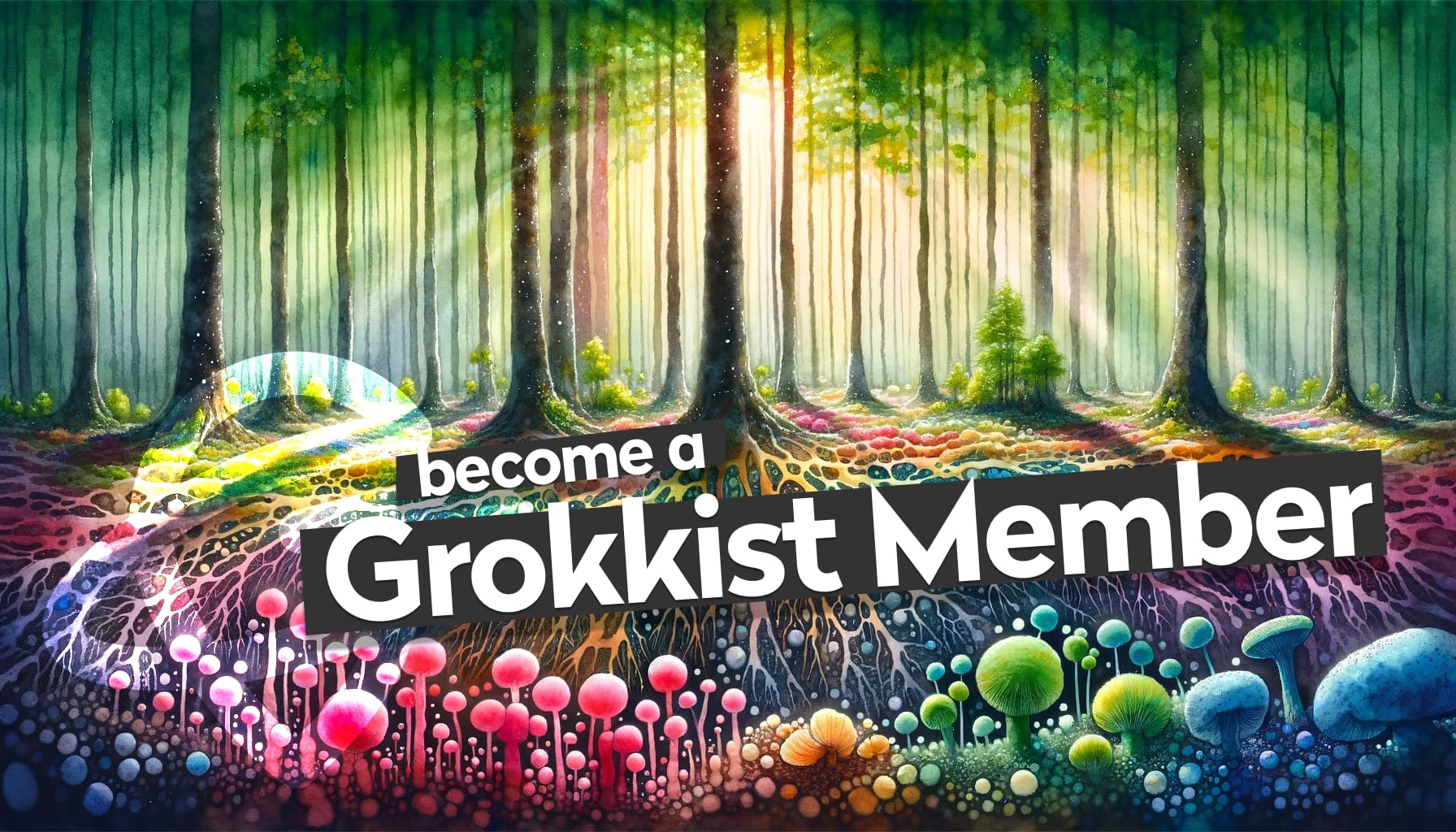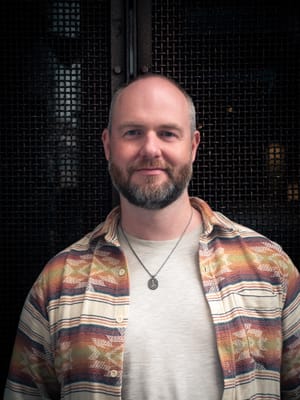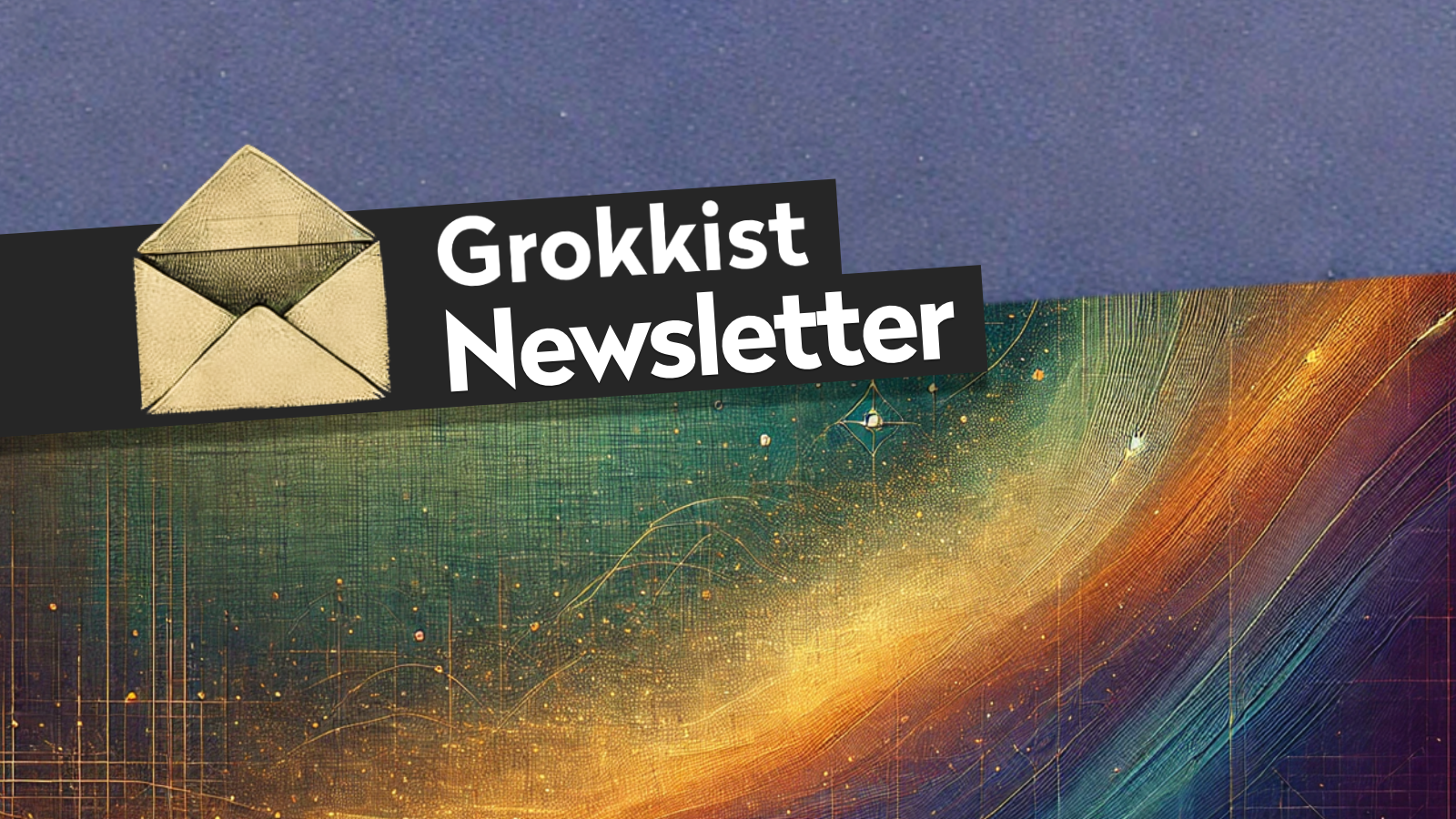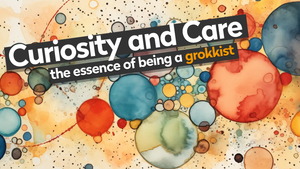New here? You can always explore more or orient yourself with the First Sparks series or via the Grokkist Network Welcome Hub.
Not for you? update your settings or unsubscribe anytime using the links at the bottom of the email — no hard feelings. We respect your inbox.
Hey friends,
I’ve just come back to Aotearoa New Zealand after a long summer in Europe, and though the trip gave me plenty of colour — a practical-philosophy dinner with grokkists in Berlin, a spontaneous tango class in Brighton, late-night conversations with people rethinking economics, education and technology, and chance meetings on overnight trains — what it’s really left me with is a renewed sense of how many ways there are to make a life.
Some people I met were deliberately living small: “more fun, less stuff,” fitting their days to a collapsing world with intention and restraint while experimenting with new forms of degrowth economics.
Others were unfurling themselves across continents, dreaming at a scale that dwarfed any single nation — building new cultural movements, designing new fashion lines, inventing AI chips, reimagining infrastructure.
Most of the time their values seemed to rhyme, but sometimes the same values led them down opposite paths.
It reminded me again that not every difference is a misunderstanding to be corrected. Sometimes the differences are real and don’t collapse into one neat truth, however much we wish they would.
The philosopher Isaiah Berlin used to talk about “many kinds of good life” and he meant it in a very ordinary way.
He’d use an example anyone could picture: a nun and a mother.
Both are admirable lives, but the central goods of each can’t really be swapped. A life built on vows of celibacy and contemplation can’t be added up on the same scale as a life built on intimacy, children, and family.
One isn’t better than the other, but they point in different directions, and trying to mash them together would ruin what’s essential about each. That’s what philosophers call “incommensurability” — not a fancy word for “incompatible,” but a recognition that some good things can’t be measured against each other at all.
The modern world often rests on a quiet faith in liberalism — the idea that if we protect individual rights and create neutral rules, everyone can pursue their own version of the good life.
For many, liberalism remains a powerful idea worth defending, while for others it’s a dated framework they’re eager to move beyond. In my After the End of History series I’ve explored why both perspectives arise — and why liberalism, however influential, isn’t the whole story.
Liberalism can make it sound as if all genuine disagreements are just mistakes that more information or tolerance will fix.
Value pluralism, by contrast, starts with the fact that there are lots of worthwhile ends and some will inevitably clash. The goal isn’t to iron out all the tension but to live with it more gracefully.
In real life that doesn’t look like a set of procedures; it looks like two neighbours who vote differently but still lend each other a ladder, or a parent and child who love each other even though they’ve chosen radically different paths.
Instead of hoping for convergence, we might hope for coexistence – a way of living alongside each other.
In practice, that’s not an abstract theory but rather the practical skill of learning how to share a world with people who are living out goods we don’t share, and sometimes don’t even fully understand.
I find this way of seeing more humane than the idea of a single neutral truth, but also more demanding.
It asks us to stand alongside people whose lives embody goods we don’t share, and sometimes even feel threatened by, and to resist the reflex to translate everything back into our own terms.
Curiosity helps here. Not the curiosity of collecting information, but the curiosity of slowing down our reactions, holding our own story lightly while we let another person’s world come into focus.
It’s the discipline of Not Knowing: sitting at someone else’s fire long enough to feel its warmth without dragging our own logs over there. Suspended judgement is about putting discernment on a gentle delay, giving it time to ripen so that when we do judge, it’s supple rather than brittle.
That’s why I think curiosity is more than a personal virtue; it’s a civic one.
Our universal rights frameworks give us a necessary baseline, but they don’t help much when two genuine goods collide — they’re not designed to.
Curiosity, care and conversation can at least keep the door open while we figure out how to live alongside each other. In an age of divisive righteousness, that feels like a survival skill.
I’m writing this as someone who’s personally choosing the “big life.” I want to step out more boldly, to expand Grokkist and my own work across borders, to live large and connect widely. But that doesn’t make the small-and-deep lives I encountered any less compelling; in some ways I envy their rootedness.
What matters to me is that these different dreams can meet each other intelligibly and with affection — that we learn to hold space for many fires without insisting they merge into one.
That’s what Grokkist is trying to be: a hearth where people can explore their own kind of flourishing while encountering others doing the same.
This is also why Grokkist has been evolving. We’ve recently opened up our recordings library so anyone in the Grokkist Network can wander through past talks — themed cafés on AI and social media, Kim Tairi’s extraordinary reflection on life as an Indigenous feminist leader, Dr Rodney King’s story of recovery and reconnection.
Next month we’re launching the Members Lab & Lounge, our new anchor format that brings together everything I've learned so far about groksmithing—making deliberate space for hands-on practice and meaningful help—and about creating places where people living very different good lives can meet, become more intelligible to each other, and continue kindling curiosity and care across the gap.
My hope is that somewhere in these encounters, you’ll feel welcome to sit down at the fire for a while, to see another life up close, and maybe to find something in yourself stirring in response.
With curiosity and care,
Danu
If you’re standing at a threshold in your own story, this space is built with you in mind.
I support myself through Groksmithing and Grokkist Projects — hands-on, relational work that helps people make sense of where they are and find momentum toward what’s next. Sometimes that looks like structured guidance, sometimes it’s rolling up our sleeves together.
The whole Grokkist ecosystem runs on Memberships — a gentle invitation to belong without needing to fit in, and a way to sustain the work. If you're curious about the deeper why behind it all, start here.
Grokkist Press
A home for creations that matter, where grokkists publish gifts of wisdom and creativity that inspire, challenge, and invite deeper connection.
Visit the Press ↗The act of living fully and authentically, in alignment with your values, potential, and deeper connections to the world around you.
Read on for a deeper explanation or discover more luminous phrases in the Glossary of Grokkistry.
Fresh and Featured Pressings

Articles of Faith
By Peter Gilderdale (4 min read)
Untangling what we know from what we take for granted can be a frightening challenge, but deepening our relationship to the truth may be worth the discomfort.

Life as a Lab
By Jessica Böhme (3 min read)
The best discoveries are often the ones we could never have predicted.
More from the Press
- The Problem of Fairness (Peter Gilderdale, 5 min read) – How can we know what's fair when our understanding of the word may depend on the hand we've been dealt?
- A Little Bit of Pollyanna (Peter Gilderdale, 4 min read) – How deep are we willing to dig to find the good in people?
You can also read our guide to learn how the Grokkist Press works and how to get involved.
Grokkist Network
Connect across disciplines, generations, and geographies in Grokkist’s global community—a true speakeasy for the soul.
Visit the Network ↗Upcoming Events
Events Access Key
🟢 Open Access: Free and open to all.
🟣 Member Access: Exclusive to Grokkist Members.
🟠 Ticketed Access: Open to all with a cover charge (members enjoy a 30% discount).
For more info, check the guide to our events and gatherings or this guide if you're interested in hosting an event of your own.

🟢 Grokkist Writing Salon
🗓️ Mon 6 Oct | 7pm–9pm UK time (view in your timezone)
Facilitated by Alan Raw
The Grokkist Writing Salon is a warm, gently-structured space for people who write—or want to—where words are welcome in all their messy, meaningful, unfinished glory. It’s for those who care about what they’re saying and how they’re saying it, and who don’t want to do it alone. Whether you’re journaling your way through a life chapter, polishing a piece for publication, or just wanting to play with language and ideas, there’s room for you here.
What we’ll do
Check in – arrive as you are, share what’s moving in your creative world
Read aloud – bring something you’re working on (or don’t!) and receive reflective, resonant feedback
Play together – create collaboratively through prompts or impromptu story games
Try a tool – each session introduces a creative lens or framework you can use in your writing
Circle of care – open space to ask for help, spark collaborations, or share what’s next
No prep needed. No pressure to share unless you want to. This isn’t about performance or polish—it’s about having a regular practice, a creative home, and good company for the road.
Between sessions, you’re invited to continue the conversation in the Writing Salon discussion space, and you’re warmly encouraged to self-organise side sessions, co-writing jams, or parallel play meetups with others.
Other Upcoming Events
- 1 Oct | 🟣 Seed of a Wish: from complaint to "Yes Please"
- 15 Oct | 🟢 Listening to Tulip Poplar: a heart-centered plant communication workshop
- 16 Oct | 🟢 PhilosophyGym @ Grokkist
🍬 Snackables
A curated collection of hand-picked inspirations—thought-provoking reads, engaging ideas, and creative sparks to nurture your curiosity and expand your perspective.
#1 - When we hug, we build a house

Love isn’t just about finding the right person, but also about learning how to live more fully with yourself and the world you create together. In this long, tender reflection, Chusana Prasertkul traces the arc of her 17-year relationship — from falling for her partner’s soul, to discovering her own, to shaping a shared life that has weathered family estrangements, reconciliations, and growth. The author, who often writes about how social systems and cultural structures shape our inner worlds, here traces a story of love as a trilogy, of systems personal and societal, and of how intimacy can rewire the very ways we understand what it means to be human. "When the storms come, whether stirred up by friends, family or the world at large, you shelter each other."
#2 - Why Danish sounds like a 'throat condition'
Danish is famously mocked by its Scandinavian neighbours for sounding like its speakers have a potato permanently lodged in their throat. Having just spent three months in Denmark being made to wrestle with phrases like rødgrød med fløde, I can confirm it’s as throaty as advertised. But how did it get that way?
This deep-dive from NativLang takes us on a tour through Old Norse and a cascade of phonological changes — from vowel collapse to the distinctive stød, and even the rise of Copenhagen speech over regional dialects — to explain how Danish ended up as the odd one out among the Scandinavian languages. The video also comes with a rich sources doc for anyone who wants to follow the linguistic breadcrumbs.
#3 - Who poisoned Zhu Ling?

In 1995, a gifted Tsinghua University student collapsed mid-performance with symptoms no doctor could explain. It took an early online plea to Usenet — “Docs in China unable to diagnose this disease. HELP!!” — for foreign toxicologists to correctly diagnose thallium poisoning when local doctors could not. Zhu survived, but with devastating brain damage, and her suspected poisoner — a politically connected roommate — was never charged.
This 2018 article traces the unanswered questions that turned Zhu’s story into one of China’s most infamous unsolved crimes, a “Chinternet zombie” case — officially buried, yet impossible to silence. Zhu since passed away in December 2023, prompting a fresh wave of grief and anger. The unanswered question still haunts Chinese forums, Wikipedia pages, even White House petitions: who poisoned Zhu Ling?
#4 - Self-portrait as a coffee pot
William Kentridge’s work is an ongoing conversation with memory, history, and the messy act of making. Best known for his stop-motion charcoal drawings that erase and redraw themselves into being, his practice is crowded with ghosts — of colonial legacies, personal histories, and the studio as a place where fragments are continually reassembled.
His nine-part film series Self-Portrait as a Coffee Pot (2020–22), created in his Johannesburg studio during the pandemic, stages dialogues between multiple versions of the artist himself. Ideas, mistakes, and half-formed memories collide as the coffee pot becomes both object and alter ego — a reminder that selfhood can be sketched as much through things and gestures as through the face. Watch the trailer, hear Kentridge reflect on it here, or stream the full series on MUBI.
I recently visited his exhibition The Pull of Gravity at Yorkshire Sculpture Park, which sets this film alongside bronzes, mechanised figures, and drawings. Seen together, the works echo the same questions: how do we piece meaning together from fragments, and how do the traces of history linger in every act of creation?
#5 - Diary of a popcorn seller

What’s it like to spend a week serving popcorn in a Glasgow multiplex? Selling popcorn might look like mindless work, but Lucy Fitzgerald’s diary reads more like the thick description of ethnography. “Every customer interaction is a vignette of personhood: psychological insight moored by food.” Between sweeping kernels, mediating sweet-vs-salty disputes, M&Ms on popcorn, watching Marvel completists queue for themed buckets, and noticing the small graces of tired teachers or awkward teens, Fitzgerald captures the fragile rituals of cinema-going in an age of streaming.

Membership Benefits
As a Grokkist Member, you’re part of a circle of active grokkists walking the grokkist path. Here’s what membership includes:
- 🟣 Member-Only Gatherings including Lab & Lounge
- 🧩 Three Self-Guided Courses (Red Thread, Ecosophy, ADHD Meditation)
- 🛠 Ongoing Groksmithing Project Support at Member Rates
- 📚 Free eBooks from Grokkist Press
- ❤️🔥 30% Discount on Courses and Ticketed Events
- 📣 Post Calls, Invitations, and Events
- ✨ Early Access to Pilots and Prototypes
- ⭐️ Digital Member Badge
👉 Your membership also helps fund the operating costs of Grokkist and supports community-led projects and initiatives.
A pair of parting thoughts...
“In case you wish to befriend an elephant keeper, be certain to have room for the elephant.” ― old Indian saying
“Let life live you for a while instead of trying to make yourself live life.” ― Alan Watts
This newsletter was sent to 800+ curious and caring subscribers. Help us expand the grokkiverse by telling a friend about our newsletter. You can share this edition directly with others using this link:
grokk.ist/newsletter/76/
That's it! Thanks for reading. Hit reply and get in touch anytime – I love hearing from you.










Member discussion